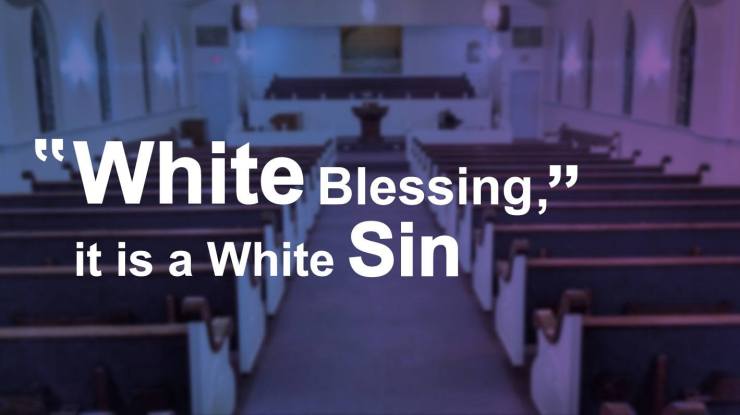By Yenny Delgado
As a result of the largely peaceful protest throughout the globe as a result of the murder of George Floyd, Christian leaders are being forced to address the issues of anti-black racism and white supremacy in the church. For many congregations, the response has done one or all of the following actions:
- Placing a Black Lives Matter banner in front of the sanctuary;
- Books Club from authors including Robin D’Angelo, Ibram X. Kendi, and Michelle Alexander
- Develop spaces, albeit virtually, to honestly discuss history, current events, and hopefully a future way forward.
In one discussion, European American Pastor Louie Giglio from the Atlanta Megachurch Passion City had a conversation with the African American rapper Lecrae Moor and the European American Chick-fil-A chief executive Dan Cathy. In this discussion, he said the following words:
“But I want to flip that upside down because I think the other side of it is true with our nation’s history. We understand the curse that was slavery, white people do, and we say, ‘that was bad,’ but we miss the blessing of slavery that built up the framework for the world that white people live in.”
In this one phrase, the Pastor’s theology is made clear. He connected the dehumanization of others through chattel slavery as a blessing; Pastor Giglio reminded his audience of the real attention of many churches and Christian leaders when it comes to deal with the sins of the past. Moreover, his framing of slavery as a blessing is not a new concept but harkens to Europeans’ original views that arrived on this continent. Upon arrival, they viewed the land as a new start and an opportunity to live out their faith and truth. In the early 1500s, the majority of people living in Europe were poor farmers, uneducated, and living under fear as such America represented an opportunity to restart in “virgin land”.
“Every activity, personal and communal, was irreducibly part of the holy war against Satan and the infidels. The aristocracy of saints had to work ceaselessly at this critical moment to make the present world as solemnly and gloriously Christian as it could be. One result was to put great emphasis on the purity of the community, on always determining who was inside and outside, on eliminating deviance.”
Christians had constructed an image of God who blessed them to maintain purity and not intermingle with others. After removing the native populations through an orchestrated genocide, Europeans began enslaving Africans to work the land. The enslaved primarily formed the nation’s economic backbone and led to the development of modern capitalism and wealth around the cotton trade. As explained by Sven Beckert, this business increased wealth and resources. Due to economic growth, churches began to flourish, and new denominations arrived and grew along with the growth of slavery.
Growing denominations throughout the country were linked with the objectification of Africans through chattel slavery. As an audit of the Princeton Theological Seminary and its interaction with slavery reported in 2019, “several of its founders and prominent leaders were entangled with slavery and even employed slave labor themselves.” Enslavement of people with dark skin was a regulation encoded by the law and supported by theological text from some verses from the Old Testament where slavery was practiced.
After independence, some denominations, such as the Quakers, spoke out against slavery, but most churches chose to address only “spiritual matters” and concentrated on maintaining the system. Dr. Yolanda Pierce, Dean of Divinity School at Howard University, states, “So much of early American Christian identity is predicated on a proslavery theology. From the naming of the slave ships to who sponsored some of these journeys including some churches, to the fact that so much of these journeys including some churches.”
Now in June 2020, a Christian Pastor once again proposes to formulate that idea of slavery as overall beneficial to “white people.” Indeed, he is right – through dehumanization and murder, one can become extremely wealthy and build an unequal society; this is the story of European descendants in the United States.
However, as Christians, we need not mince words with blessing or privilege. The way the church helped to support and construct a white supremacist country based on anti-black racism is WHITE SIN. When did the Christian church in the United States change and repent for this sin? In the imagination of the church, everyone is welcomed, but on paper, the theology is trapped in the past. Just as Pastor Giglio is saying, it is not a white privilege but is a white blessing.
If churches and congregations genuinely hope to have a real conversation about the ongoing protest on the street, it will take more than a few books, rallies, and the framing of slavery as a white benefit. As a first step, the church needs to truly rebuke the sinful actions of this country and the forefathers in actions that are in complete opposition to the Gospel of Jesus Christ. This is done through the hard work of reading the history and then seeking dialog and repentance from those communities that have continually been negatively affected by policies and laws after the Civil War only to benefit white people.
For the church and Christians, these hard truths should lead to change systemically, and if not, then perhaps these places are not churches but social clubs where white people enjoy gathering on Sunday morning.
_____________________________________________________________________________________________________

Yenny Delgado (she/her/ Ella) Social psychologist and contextual theologian. She writes about the intersections between politics, faith, and resistance.
Follow me on twitter @yennydc

Published by